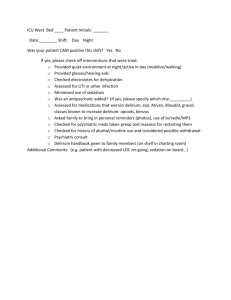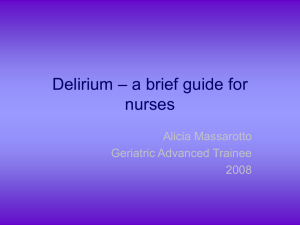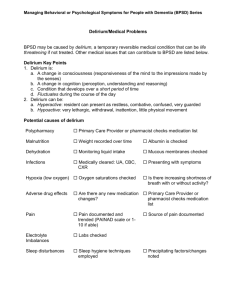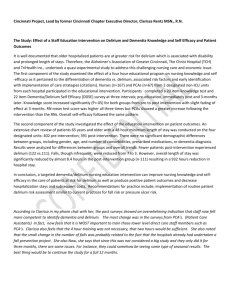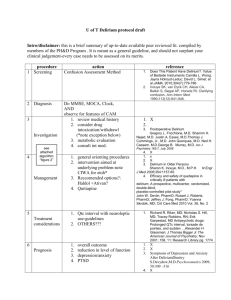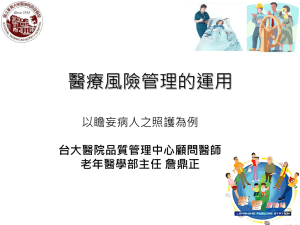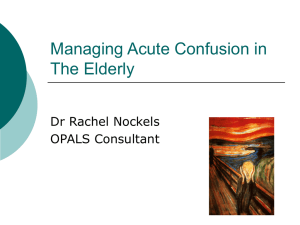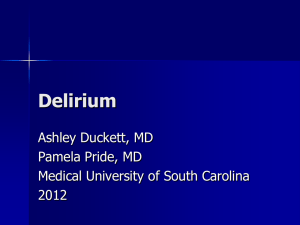DV Hospital Delirium leaflet
advertisement
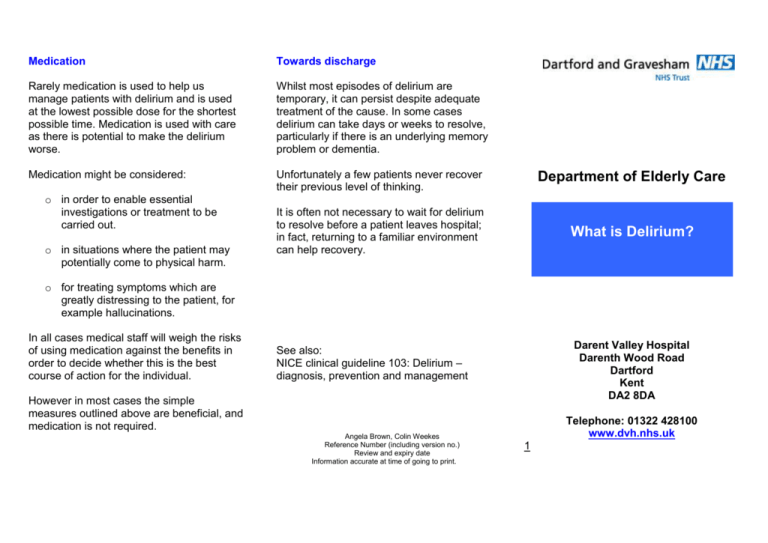
Medication Towards discharge Rarely medication is used to help us manage patients with delirium and is used at the lowest possible dose for the shortest possible time. Medication is used with care as there is potential to make the delirium worse. Whilst most episodes of delirium are temporary, it can persist despite adequate treatment of the cause. In some cases delirium can take days or weeks to resolve, particularly if there is an underlying memory problem or dementia. Medication might be considered: Unfortunately a few patients never recover their previous level of thinking. Department of Elderly Care It is often not necessary to wait for delirium to resolve before a patient leaves hospital; in fact, returning to a familiar environment can help recovery. What is Delirium? o in order to enable essential investigations or treatment to be carried out. o in situations where the patient may potentially come to physical harm. o for treating symptoms which are greatly distressing to the patient, for example hallucinations. In all cases medical staff will weigh the risks of using medication against the benefits in order to decide whether this is the best course of action for the individual. Darent Valley Hospital Darenth Wood Road Dartford Kent DA2 8DA See also: NICE clinical guideline 103: Delirium – diagnosis, prevention and management However in most cases the simple measures outlined above are beneficial, and medication is not required. Angela Brown, Colin Weekes Reference Number (including version no.) Review and expiry date Information accurate at time of going to print. Telephone: 01322 428100 www.dvh.nhs.uk 1 What is Delirium? Who gets delirium? Why is delirium important? Delirium is a common syndrome, particularly in older people in hospital where it can affect up to one half of inpatients. Whilst anybody who is unwell can become delirious, some groups of people are more at risk than others. These include: Delirium can be a sign that someone is unwell or becoming unwell. It can provide an early warning to staff that further examination is needed. Delirium is usually temporary and can be associated with a wide variety of symptoms such as: o Patients with dementia or other memory problems o Frail older patients o Those with problems affecting sight and hearing o Any recent surgery o Those going through a terminal illness o Sudden change in mental state o Confusion o Restlessness, agitation or sleepiness o A change in personality o Difficulty walking, swallowing, speaking o Hallucinations, paranoia o An inability to recognise family Importantly it is different from dementia, although the symptoms can often be similar (see also our What is Dementia leaflet) We encourage families and carers to tell the healthcare team if they notice any sudden changes or fluctuations in behaviour as this might represent the development of delirium. Why does it happen? There are a large number of possible causes. When a patient is diagnosed with delirium, medical staff will consider: o o o o Infection e.g. chest, skin, urine Stroke or head injury Dehydration Medication: especially sleeping tablets and some painkillers o Constipation o Being in an unfamiliar environment Often there is more than one cause. Occasionally a cause for delirium is not found, despite appropriate examinations and tests. Knowledge about delirium can help the patient, their relatives and staff understand why someone is behaving the way they are. A change in behaviour can be surprising and upsetting, and delirium can be a traumatic experience both for the person affected and family members. In addition, some measures have been shown to prevent delirium, and help to shorten its duration once present. What can family and friends do? Stay calm, reassure and use short simple sentences when speaking Try not to agree with unusual or incorrect ideas – change the subject Remind the person of what is happening to them: where they are and why Remind of the time and date: can use a clock or calendar Bring familiar objects from home if possible, for example family photographs Use glasses and hearing aids if needed Ask to fill in a “This is Me” document
